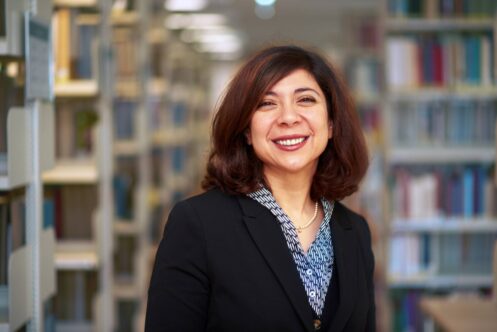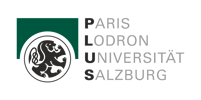Univ.-Prof. Dr. Hanan Badr
Head of Division Public Spheres and Inequality Research

Room: mezzanine 015, Rudolfskai 42, 5020 Salzburg
Office hours: by appointment
Phone: +43-662-8044-4163
Mail: Hanan.Badr@plus.ac.at
Prof. Dr. Hanan Badr has been promoted to university professor in the department of Communication Studies at the University of Salzburg, effective March 1, 2022. She heads the division of Public Spheres and Inequality Research. Previously, she worked at locations such as Freie Universität Berlin, Gulf University for Sciences and Technology in Kuwait, Cairo University and Orient-Institut Beirut / Max Weber Foundation. Hanan Badr was born in Cairo, Egypt, and studied Communication Studies, focusing on Journalism and International Communication earning Bachelor of Arts and Master of Arts degrees. Afterwards, she received a DAAD scholarship for her doctoral studies at the Chair of International Communication and Comparative Media Systems at the University of Erfurt.The focus of the professorship is the study of public spheres and inequality on macro, meso and micro levels, considering globalization and digitalization. Topics include global communication, asymmetries and postcolonial theories, (digital) public spheres in polarized societies, media, activism and social movements, media, transformation and protest communication in North Africa, and media and migration.
- Publics and inequality at the macro, meso and micro levels
- Activism and social movements
- Media, Transformation and Protest Communication in North Africa
- Media and migration
- International Communication Association (ICA)
- Vice-Chair of ICA Activism, Communication and Social Justice Interest Group
- International Association for Media and Communication Research (IAMCR)
- German Society for Journalism and Communication Studies (DGPuK)
- KriKowi Network
- Media, Communication and Cultural Studies Association (MeCCSA)
- Arab-U.S. Educators for Communication Educators (AUSACE)
- Arab-German Young Academy of Sciences and Humanities (AGYA)
The current research documentation can be found here.
Notes for Master’s examinations with Univ.-Prof. Hanan Badr (applies to first and second examinations)
1. preparation:
You contact me (hanan.badr@plus.ac.at) and together we choose a topic for the exam. The topic can be chosen from the full range of communication studies, but it is advisable to be guided by my research interests. As a researcher, I am interested in public spheres and inequalities at the macro, meso and micro levels, with a particular focus on the impact of globalization and digitization. Specific topic areas include:
– Digital Public Spheres
– Global communication, foreign reporting and framing
– Critical theories
– international comparative media systems and media cultures
– Activism, protest and social movements
– Media, Transformation and Protest Communication in North Africa
– Media and migration
2. literature list:
Gain an overview of key literature on the chosen topic. The literature you are working on should be 150-200 pages long (the equivalent of about 8 texts) and include scientific articles and book chapters in English and German. Follow the department’s citation guide when compiling a bibliography. You can send them to me by e-mail (hanan.badr@plus.ac.at) and I will give you a short feedback about them.
3. thesis paper:
The thesis summarizes and critically reflects the texts in the bibliography. In doing so, your reflections should be 2-3 pages each. Be sure to use the correct citation method, refer to the department’s citation guide.
The thesis should include the following items:
– Key information about the authors
– Summary of content (topic, research question(s), key messages/results).
– How does the text fit in with the rest of the literature and your level of knowledge? Where are there similarities or contradictions with current research?
– What aspects surprised you or stand out in your mind?
– What do you think are the strengths and weaknesses of the text? (This can refer to the scientific approach, such as the theoretical framework, the method, or the presentation of results).
At least one week before the exam date, send me your thesis paper by e-mail (hanan.badr@plus.ac.at).
4. Exam:
The exam lasts 45 minutes. The thesis and your critical reflection will be the focus. In addition to your knowledge of the subject matter, the Master’s examination places special emphasis on your ability to think critically, to reason, and to transfer knowledge.

